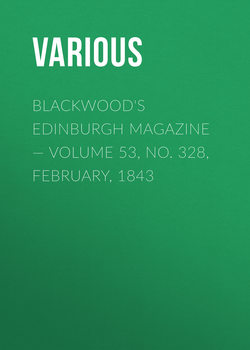Blackwood's Edinburgh Magazine — Volume 53, No. 328, February, 1843

Реклама. ООО «ЛитРес», ИНН: 7719571260.
Оглавление
Various. Blackwood's Edinburgh Magazine — Volume 53, No. 328, February, 1843
ARNOLD'S LECTURES ON HISTORY
POEMS AND BALLADS OF SCHILLER
No. V. THE VICTORY FEAST
RUDOLPH OF HAPSBURG.—A BALLAD
THE WORDS OF ERROR
THE WORDS OF BELIEF
THE MIGHT OF SONG
HONOUR TO WOMAN
THE FIGHT WITH THE DRAGON
REYNOLDS'S DISCOURSES. PART II
THE YOUNG GREY HEAD
IMAGINARY CONVERSATION
CALEB STUKELY
THE WORLD OF LONDON. SECOND SERIES
PART II
CONCERNING SLOW FELLOWS
OF THE ARISTOCRACY OF POWER
THE PHILOSOPHY OF DRESS
OF PRETENDERS TO FASHION
EYRE'S CABUL
THE EVACUATION OF AFFGHANISTAN
DEATH OF THOMAS HAMILTON, ESQ
Отрывок из книги
[This noble lyric is perhaps the happiest of all those poems in which Schiller has blended the classical spirit with the more deep and tender philosophy which belongs to modern romance. The individuality of the heroes introduced is carefully preserved. The reader is every where reminded of Homer; and yet, as a German critic has observed, there is an under current of sentiment which betrays the thoughtful Northern minstrel. This detracts from the art of the Poem viewed as an imitation, but constitutes its very charm as an original composition. Its inspiration rises from a source purely Hellenic, but the streamlets it receives at once adulterate and enrich, or (to change the metaphor) it has the costume and the gusto of the Greek, but the toning down of the colours betrays the German.]
[Hinrichs properly classes this striking ballad (together with the yet grander one of the "Fight with the Dragon") amongst those designed to depict and exalt the virtue of Humility. The source of the story is in Ægidius Tschudi—a Swiss chronicler—and Schiller (who, as Hinrichs suggests,) probably met with it in the researches connected with the compositions of his drama, "William Tell," appears to have adhered, with much fidelity, to the original narrative.]
.....
[Hinrichs properly classes this striking ballad (together with the yet grander one of the "Fight with the Dragon") amongst those designed to depict and exalt the virtue of Humility. The source of the story is in Ægidius Tschudi—a Swiss chronicler—and Schiller (who, as Hinrichs suggests,) probably met with it in the researches connected with the compositions of his drama, "William Tell," appears to have adhered, with much fidelity, to the original narrative.]
Безопасно оплатить книгу можно банковской картой Visa, MasterCard, Maestro, со счета мобильного телефона, с платежного терминала, в салоне МТС или Связной, через PayPal, WebMoney, Яндекс.Деньги, QIWI Кошелек, бонусными картами или другим удобным Вам способом.
.....